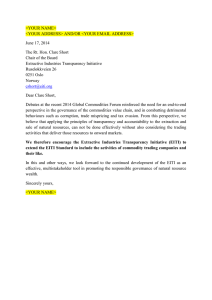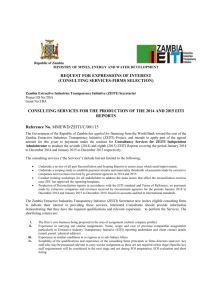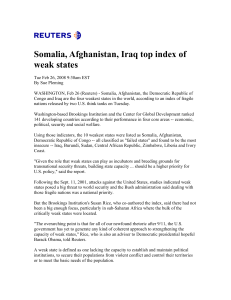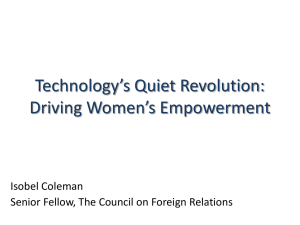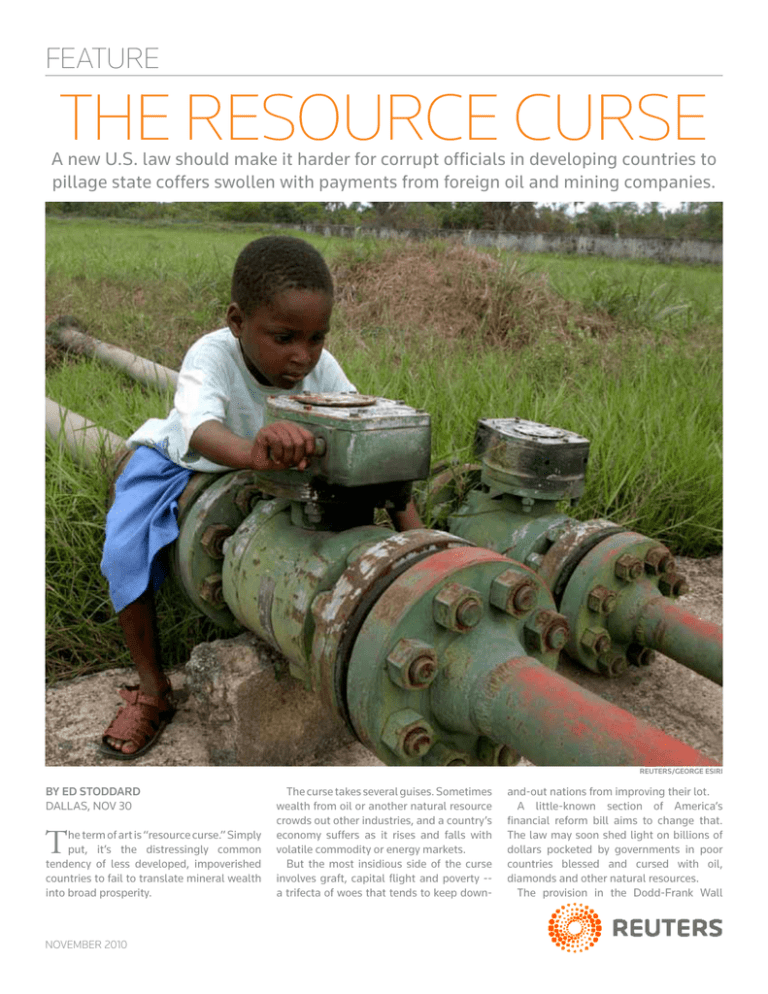
feature
the resource curse
A new U.S. law should make it harder for corrupt officials in developing countries to
pillage state coffers swollen with payments from foreign oil and mining companies.
REUTERS/George Esiri
By Ed Stoddard
DALLAS, Nov 30
T
he term of art is “resource curse.” Simply
put, it’s the distressingly common
tendency of less developed, impoverished
countries to fail to translate mineral wealth
into broad prosperity.
november 2010
The curse takes several guises. Sometimes
wealth from oil or another natural resource
crowds out other industries, and a country’s
economy suffers as it rises and falls with
volatile commodity or energy markets.
But the most insidious side of the curse
involves graft, capital flight and poverty -a trifecta of woes that tends to keep down-
and-out nations from improving their lot.
A little-known section of America’s
financial reform bill aims to change that.
The law may soon shed light on billions of
dollars pocketed by governments in poor
countries blessed and cursed with oil,
diamonds and other natural resources.
The provision in the Dodd-Frank Wall
NATURAL RESOURCESnovember 2010
FOR AND AGAINST
The battle lines are already emerging.
Exactly what form the the new rules will take
is still being negotiated.
Many U.S. companies and industry groups
oppose the change, fearing it will make it
tougher to compete with their Chinese rivals.
But the provision has spawned an unusual
alliance between anti-poverty campaigners
and some Wall Street investor groups
backing it.
For their part, activists are hoping greater
transparency will make it harder for corrupt
governments to siphon off funds that should
be used for the general population. As for
investor groups, they are counting on the law
to make it easier to judge the risks -- criminal
or otherwise -- being taken by companies in
frontier markets where information is often
hard to come by.
It aims to lift the veil of secrecy that shrouds
financial flows and extractive industries
because it will provide a far more detailed
picture of how much money governments are
actually raking in from the energy and mining
companies operating within their borders.
Paul Bugala, a sustainability analyst
with Calvert Asset Management Company,
which has almost $15 billion in assets under
management, said changes in tax and royalty
policies in resource-rich countries can have a
dramatic impact.
“This (provision) can help investors gauge
when this is happening,” he said, pointing to
Shell in Nigeria as an example. In a briefing
Disappearing money in Africa
According to Global Financial Integrity, a non-profit advocacy group, total illicit financial outflows
from Africa, conservatively estimated, were approximately $854 billion from 1970 to 2008.
Top 5 African countries financial outflow – $ billions
Nigeria
Egypt
Algeria
Morocco
South Africa
0
20
40
60
80
29/11/10
Street Reform and Consumer Protection
Act will require much more transparency
from companies in the so-called extractive
industries -- miners and energy companies
-- on payments to foreign governments. The
idea is to make it harder for corrupt officials
to pillage state coffers swollen with royalty
and other payments from foreign oil and
mining companies.
This is no trifling amount of money.
As an example of what is at stake, an
estimated $27.5 billion flowed illicitly out
of oil-rich Nigeria in 2009, according to
calculations provided exclusively to Reuters
by Global Financial Integrity (GFI), an
advocacy group that tracks such trends. That
sum is part of a much wider stream of illicit
money being channeled from resource-rich
countries in the developing world to banks
and tax havens elsewhere.
In a report earlier this year, GFI estimated
that Africa alone lost $854 billion in illicit
flows from 1970 to 2008.
100
Source: Global Financial Integrity
Reuters graphic/Stephen Culp
“This (provision)
can help investors
gauge when this is
happening.”
circulated to the investment community,
he noted: “The oil and gas output of Shell’s
subsidiary in Nigeria ... dropped by 65
percent from 1.05 million barrels per day in
2005 to 360,000 barrels per day in 2008
due to shutdowns caused by conflict in the
Niger River Delta.”
“The full impact of Shell’s drop in
production in Nigeria between 2005 and
2008 and its plans for the country cannot
be modeled completely without information
regarding the related tax, royalty and other
obligations.”
The net that has been cast here is wide. It
will include not only companies such as oilgiant Exxon that have their domiciles in the
United States but also any energy or mining
company registered with the SEC because of
secondary listings.
By some U.S. congressional estimates, this
may include 70 percent of publicly-listed
international oil and mining companies and
the net will almost certainly widen.
The European Commission has launched
public consultations on the issue, noting
the reporting requirements for extractive
industries laid down by Section 1504 of the
Dodd-Frank Act, which it says may become
global accounting standards.
The International Accounting Standards
NIGERIAN LIFE: A boy takes a break from swimming in the
polluted waters of the Makoko fishing community in Lagos
November 21, 2009. REUTERS/Goran Tomasevic
Board is considering a standard for extractive
industries that could be similar, but while the
process is underway it could take years.
And according to U.S. congressional
sources, British politicians are signaling their
intention to craft similar legislation to be
applied to UK-listed firms in the sector.
“There have been inquiries made to me
about how to get this legislation done
by parliamentarians in England ... I have
2
NATURAL RESOURCESnovember 2010
SPREADING THE WEALTH: Workers protest in the streets of Nigeria’s commercial capital Lagos May 13, 2009. REUTERS/Akintunde Akinleye
had communication with London, there is
certainly interest there,” said Ben Cardin, a
Democratic senator from Maryland.
PROJECT BY PROJECT
Cardin and Barney Frank -- the
Massachusetts Democrat who will chair the
House of Representatives Financial Services
panel until January -- both invoked the
“resource curse” in interviews with Reuters
when speaking to their motivation for
pushing for the provision.
Supporters see the U.S. move as a
welcome addition to the Extractive Industries
Transparency Initiative (EITI), launched by
former British Prime Minister Tony Blair at the
World Summit on Sustainable Development
in Johannesburg in 2002.
Critics say the EITI’s main weakness lies in
the fact that governments have the option
of signing up for it and many resource-rich
nations with transparency issues, such as
Angola, Saudi Arabia and Russia, have not
signed up. Dodd-Frank gives companies no
choice, regardless of where they operate.
Cardin, with his senate Republican
counterpart Richard Lugar, was instrumental
not only in bringing the legislation forward
but also in inserting a key provision that
requires project-by-project reporting by
Find more Reuters special reports at
our blog The Deep End here:
http://link.reuters.com/heq72q
companies. The clause was the subject of
behind-the-scenes lobbying by the likes of
billionaire liberal activist George Soros.
“Project-by-project is a remarkable degree
of disclosure. Normally companies go by their
payments to whole regions or on a global
scale and you can’t unpick those numbers to
work out what happened in each country,”
said Nicholas Shaxson, a Swiss-based
analyst with British think-tank Chatham
House who has written extensively about oil
and transparency in Africa.
A handful of mining and energy companies
registered with the SEC already provide
detailed information on their payments to
governments -- they include South African
gold miner AngloGold Ashanti, U.S. gold
miner Newmont, and Canadian energy firm
Talisman.
But the project level of such payments will
require far more disclosure in most cases.
“This matters because it allows local
ROCKS: A visitor holds a 17 carat diamond at a Petra
Diamonds mine in Cullinan, outside Pretoria, South Africa,
January 22,2009. REUTERS/Siphiwe Sibeko
communities to identify the exact nature of
revenue streams. Where this might matter is
Zambia where a small number of companies
is involved in lots of different concessions,”
said Alex Cobham, the chief policy adviser for
British charity Christian Aid.
“If the project in your area is doing well
then you have something where you can hold
3
NATURAL RESOURCESnovember 2010
your government to account and if the project
is doing badly or at least appears not to be
making a great return you can ask questions
about whether that is a true reflection of
what’s happening,” he said.
But Cobham said that even when this is
the case, tracing where funds may have gone
after being collected by corrupt governments
remains shrouded in a tax haven haze and on
this front, critics complain little of substance
has been done.
SEC BATTLEGROUND
Lobbies from both sides are pushing the
SEC to have the legislation either de-fanged
or given a serious bite.
“We do feel that it will place U.S. listed
companies at a competitive disadvantage.
We feel like that because it requires projectlevel payment disclosures,” said Misty
McGowen, head of Federal Relations at the
American Petroleum Institute (API), a lobby
group that represents over 400 oil and gas
companies.
“When
U.S.-listed
companies
are
competing for global energy resources, nonU.S. listed companies will have public access
to confidential proprietary information that
gives them a competitive advantage,” she
told Reuters.
The API is also concerned about the fact
that it does not seek participation or input
from host governments. In its submission
to the SEC, it asked that project-by-project
disclosure be dropped and that requirements
be limited to the country level. It also asked
for “an exemption that allows companies
not to disclose payments for countries
that prohibit such disclosure” and one “for
situations where disclosure by country in
effect provides disclosure of commercially
sensitive information for a single project or
field.”
But there is also investor support for the
initiative.
In a Nov. 15 submission to the SEC, Calvert
Investments and the Social Investment
Forum said “resource-producing operating
environments pose regulatory, taxation,
political, and reputational risks that current
reporting required of resource extraction
issuers does not address adequately.”
Calvert said in its submission that the
extractive industry provisions in Dodd-Frank
were vital tools in the assessment of equity
valuations of companies in the industry.
“The calculations and assumptions made
in this process, especially those regarding
a particular project’s exposure to political
UNDERGROUND RICHES: A mine worker walks along an underground tunnel in a Petra Diamonds diamond mine in Cullinan,
outside Pretoria, South Africa, January 22, 2009. REUTERS/Siphiwe Sibeko
and other transparency-related risks, would
be enhanced greatly with the specific data
provided by (the legislation) as it is written,”
it said.
The next battles may come in the European
Union and Britain as pressure comes for them
to adopt similar rules.
And as the API notes, conflict also looms
where the SEC rules for disclosure rub up
against country-specific ones that don’t
allow them, for whatever reason.
But in such cases, American law often
comes on top,
“It’s not uncommon for U.S. law to run
afoul of foreign law. But the companies tend
to comply with U.S. law because we actually
enforce our law,” said Heather Lowe, director
of government affairs at Global Financial
Integrity.
(Editing by Claudia Parsons
and Jim Impoco)
4
NATURAL RESOURCESnovember 2010
factbox
UPHILL BATTLE:
A truck loaded
with limestone
is driven up a hill
at the Dangote
cement mine in
Obajana village
in Nigeria’s
central state of
Kogi November
8, 2010.
REUTERS/
Akintunde
Akinleye
A
provision in the Dodd-Frank Wall Street
Reform and Consumer Protection
Act will require much more transparency
from companies in the so-called extractive
industries -- miners and energy companies
-- on payments to foreign governments.
Here are some other initiatives aimed
at bringing transparency to extractive
industries, which are seen as one of the
primary sources behind tens of billions of
dollars in illicit financial flows.
Transparency
initiatives for
extractive
industries
Natural resources and transparency
The Extractive Industries Transparency Initiative is a voluntary program that aims to improve accountability in
the mining and energy sector.
EITI status*
Compliant
Candidate
Other
INTERNATIONAL ACCOUNTING
STANDARDS BOARD (IASB)
THE EUROPEAN COMMISSION
The European Commission has
launched public consultations on the
matter, noting the IASB initiative as well as
the provisions in the U.S. legislation.
g
EXTRACTIVE INDUSTRIES
TRANSPARENCY INITIATIVE (EITI)
g The Extractive Industries Transparency
Initiative was launched by former British
Prime Minister Tony Blair at the World
Summit on Sustainable Development in
Johannesburg, South Africa, in 2002.
The EITI is a coalition of governments,
companies and investors with the goal of
getting companies to publish what they
pay and governments to disclose what they
29/11/10
g The IASB is currently working on
developing a country-by-country reporting
requirement for extractive industries. The
process could take years but once finalized,
the standard is likely to become mandatory
in the European Union which typically
endorses its standards.
* A country that has fully met four EITI sign-up indicators becomes a candidate country. Once a country has obtained the
candidate status it has two years to be validated as a compliant country. Countries marked “other” have signaled their intent
to implement the EITI.
Source: Extractive Industries Transparency Initiative
Reuters graphic/Stephen Culp
receive. It has been hailed as a welcome
first step in the process that among other
things has helped raise awareness about
the issue.
But critics say one of its weaknesses lies in
the fact that governments have the option
of signing up for it and many resource-rich
nations with transparency issues, such as
Angola, Saudi Arabia and Russia, have not.
And even among candidate countries
-- so-called because they have met four
“sign-up” indicators -- analysts say it often
falls short of its goals.
One recent report for British think-tank
Chatham House about the initiative in
Nigeria concluded: “The original goals
of EITI were to improve accountability
and governance; over time, in the face
of embedded realities, these objectives
appear to have been whittled down, and
those operating within NEITI (Nigeria’s
EITI) are setting themselves more modest
goals.”
(Sources: Reuters; EITI; IASB; ‘Nigeria’s
Extractive Industries Transparency
Initiative: Just a Glorious Audit?’ Chatham
House paper, Nov 2009,
by Nicholas Shaxson)
(Reporting by Ed Stoddard)
5
NATURAL RESOURCESnovember 2010
factbox
C
Tracking illicit financial flows
alculating the amount of money
that disappears from poor countries
as a result of corruption is complicated.
Advocacy group Global Financial Integrity
(GFI) estimates that Africa lost $854 billion
in illicit financial flows from 1970 to 2008,
much of it from resource-rich states.
There are two main methods that
economists use to measure illicit financial
flows out of countries: the World Bank
residual method and trade mispricing.
The following are some details about the
methodologies which are used by GFI.
THE WORLD BANK RESIDUAL METHOD
relies on balance of payments data that is
reported by all member countries of the
International Monetary Fund under the
Special Data Dissemination System. This
data must be reported in a timely manner
and so it is available on a regular and
annual basis.
The method basically takes the two broad
sources of funding that a country has -external borrowing (including official aid)
and net foreign direct investment (FDI). It
matches them up with the use side of the
equation, which is the deficit on the current
g
account and the change in official reserves.
The latter, among other things, tracks any
external debt repayments that have been
made on behalf of the country.
Broadly speaking, it is the gap between a
country’s source of funds over a given time
and its use of funds over the same period,
which highlights illicit or unexplained
capital flows.
For example, let’s say Country X brought
in $10 billion in net FDI and external
borrowing but its use of these funds, as
shown by the current account deficit (the
difference between exports and imports
which needs to be funded) and the change
in reserves, came to $5 billion. That leaves
$5 billion unaccounted for, which must
have leaked out of the balance of payments
in unrecorded flows. The two figures should
balance out, as in an accounting balance
sheet.
How does it work? Let’s take a hypothetical
example of export under-invoicing. Say that
I’m an Indian tea exporter. I tell the Indian
government that I am exporting $3 million
worth of tea to a buyer in the United States.
But on the U.S. side, the import is reported
to be worth $5 million. Where did the other
$2 million go that the American buyer
shelled out? Probably into my off-shore
bank account.
One way to measure trade mispricing is to
look at official bi-lateral trade data, though
there may be technical problems in the
accurate recording of trade statistics.
For example, exports from hypothetical
country Manchukistan to the United States
may officially be $30 billion for a set year.
But U.S. authorities may have recorded $50
billion in imports from Manchukistan. The
$20 billion gap here would be unaccounted
for illicit flows that went somewhere else.
TRADE MISPRICING, which tracks
commercial corruption, involves the underinvoicing of exports and the over-invoicing
of imports (or vice versa). On a global
scale it is believed to account for about 60
percent of illicit financial flows.
(Sources: Global Financial Integrity (GFI);
Interview with GFI economist
Dev Kar; World Bank)
((Reporting and writing by Ed Stoddard;
Editing by Claudia Parsons))
g
NIGERIA’S POOR: A girl paddles a traditional canoe in
the Makoko fishing community in Lagos November 21,
2009. REUTERS/Goran Tomasevic
6
NATURAL RESOURCESnovember 2010
OIL WEALTH: A
ship berths on the
shore of a lagoon
as it discharges
fuel at a company
in Nigeria’s oil
hub city of PortHarcourt July 7,
2010. REUTERS/
Akintunde
Akinleye
COVER PHOTO: A child plays with a pipe near an oil well in Olomoro village in Isoko, a local government area of the Delta region in Nigeria, March 28, 2007. REUTERS/George Esiri
For more information contact:
Jim Impoco,
Enterprise Editor, Americas
+1 646 223 8923
jim.impoco@thomsonreuters.com
Claudia Parsons,
Deputy Enterprise Editor
+1 646 223 6282
claudia.parsons@thomsonreuters.com
© Thomson Reuters 2009. All rights reserved. 47001073 0310
Republication or redistribution of Thomson Reuters content, including by framing or similar means, is
prohibited without the prior written consent of Thomson Reuters. ‘Thomson Reuters’ and the Thomson
Reuters logo are registered trademarks and trademarks of Thomson Reuters and its affiliated companies.
edward stoddard
+1 972 632 7041
edward.stoddard@thomsonreuters.com

